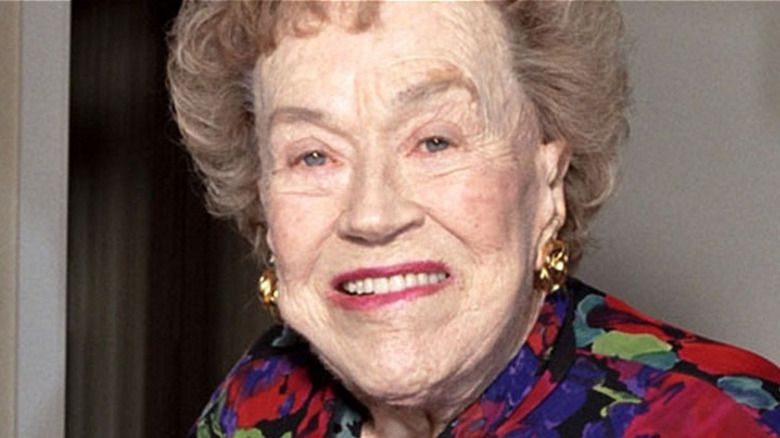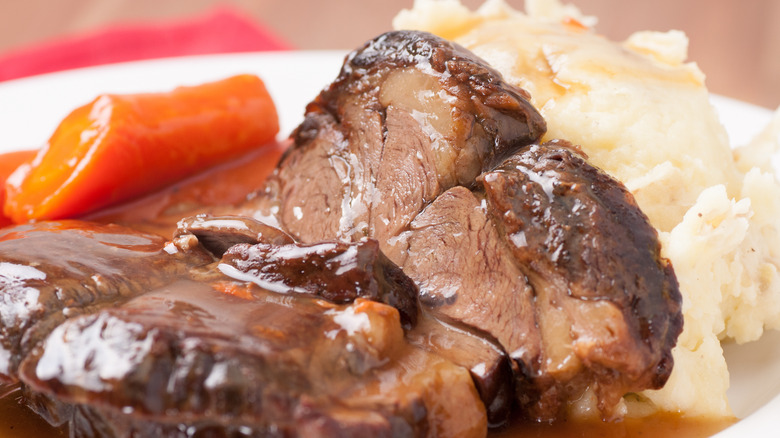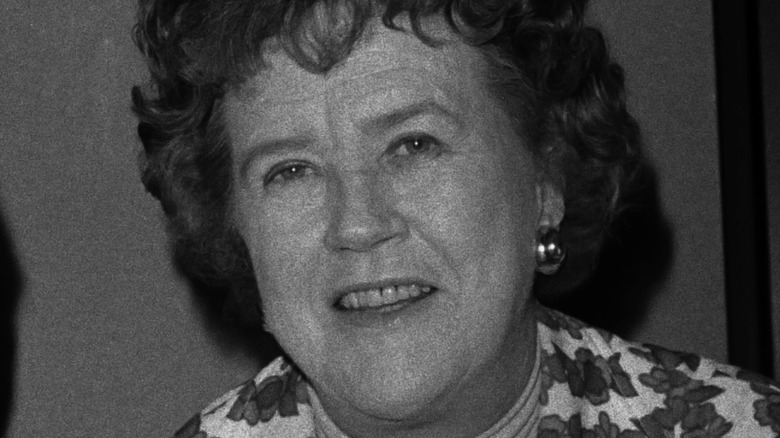What It Was Like For Julia Child Growing Up In Pasadena
Right out of the gate, the newly released documentary "Julia" shows fans that Julia Child was surprising, inspiring, and fun. It opens with the prim and perky theme song from Child's groundbreaking 1960s television show, "The French Chef," and then abruptly switches to the driving guitar licks and suggestive lyrics of Jimi Hendrix's "Let Me Stand Next To Your Fire." With this rock classic blaring in the background, viewers watch as Child slaps, stabs, and stuffs whole, raw chickens, giving one bird a thorough rub-down in butter. The wild opening invites us to let go of any assumptions we might have had about this iconic chef and embrace who she really was: a passionate, outspoken, funny, and talented woman who loved life and the sensual pleasures of food.
The documentary begins with a glimpse into the famous author and television host's life as a child growing up in Pasadena, California, with many recollections from Child herself. While she shares that Pasadena was "a lovely, lovely place to grow up," with days spent riding bikes and playing with her younger siblings John and Dorothy, it may surprise many to learn that the food and culture of Child's youth existed in stark contrast to the life she created for herself as an adult. Child says in the film, "I hadn't been turned on by anything until I got into French food."
The food of Child's youth was not too exciting
The new "Julia" documentary features interviews with several people who knew Child well. Her former assistant, Stephanie Hersh, reflects that although Child considered her upbringing to be middle-class, it's clear looking back that her family was wealthy. According to The Julia Child Foundation, her father was a successful businessman who worked in real estate, and her mother was the daughter of a paper company tycoon and former Massachusetts lieutenant governor. Child's niece, Phila Cousins, calls the house that Child grew up in a "paradise" complete with a beautiful garden of avocado and lemon trees.
In the film, Child describes the food she ate growing up as "sensible, New England-type food," such as old-fashioned roasts with sides of mashed potatoes or peas. It was a deliberately unimaginative cuisine dictated by Child's mother, who had grown up eating that way in Massachusetts. Incredibly, Child never spent any time in the kitchen growing up, nor did her mother; Hersh notes that meals for the family were prepared by a hired cook.
Child defied her father's wishes
Child's niece, Phila Cousins, shares in the "Julia" documentary that Child's father, John McWilliams, was an extremely conservative man, which was reflected in the atmosphere of their family home. Child remarks in the film that "nobody discussed food a great deal because it just wasn't done," and Cousins adds that the rules of polite society were such that one never mentioned topics like politics, money, sexuality — or food.
Child attended Smith College in Massachusetts but returned home to Pasadena after her mother's death, according to The Julia Child Foundation. Her father's expectations for Child were that she marry within her class and become a society wife. Child says that had she done that, she "probably would have been an alcoholic." Child was a romantic who craved adventure, and the beginning of World War II gave her just that chance. Child was hired by the Office of Strategic Services, a post that would eventually take her to Sri Lanka, where she would meet her husband, Paul Child. It's difficult to picture the vibrant Child we know today in the buttoned-up, no-nonsense setting of early-1900s Pasadena. Fortunately, she was brave enough to forge her own path. Writer Anne Willan notes that Child "never looked back with any wistfulness on the conservative, rather narrow life that she had lived until then."


